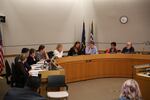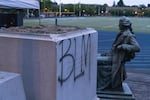Earlier this year, Portland Public Schools planned to propose a $1.4 billion, 8-year bond that would fund final work on Benson Polytechnic High School while also starting renovations at the three district high schools that haven’t already gotten major work under previous bonds.
But district leaders said cost estimates and urgent safety needs changed those initial bond plans, and COVID-19 made engaging community members more difficult.
“During this period of uncertainty, we decided we needed to be a little bit flexible and take a step back,” said board member and school improvement bond committee chair Andrew Scott.
So instead, the district plans to ask voters to support a smaller 2-year or 4-year bond at the same tax rate, with plans for a renewal after that.
The district is seeking feedback on three different options at three different estimated costs for a November 2020 bond.
Option three, the most expensive at $1 billion, allows for the full planning and construction to modernize Jefferson High School.

Jefferson High School in north Portland.
Alan Sylvestre / OPB
The district said each option would be a renewal of the current tax rate – but the options come down to whether voters might see another bond on their ballots in two years or four.
“If we went with a package closer to a billion dollars, I’m thinking we would definitely be waiting four years – because that billion-dollar package would include funding for Jefferson,” Scott said.
During a virtual town hall hosted by Portland Public Schools last week, attendees showed overwhelming support for modernizing Jefferson first and including it in the district's next bond. Jefferson has historically had the highest proportion of Black students of any Portland high school, and its campus on North Killingsworth is a centerpiece of the community.
“Being able to commit to Jefferson would really just kind of build this trust in this community,” said Shyanne Halalilo, who works at the school and for the North Portland-based nonprofit Self Enhancement Inc. "Being able to instill trust in those students … is huge, and it goes a really long way.”
Supporters of renovating Jefferson said fixing the building would show a commitment to both students and the broader North and Northeast Portland community.
“I want to encourage and challenge our school district and our communities to not just look at investing in schools, but to see that we have opportunities to invest in generations,” Mary Merriweather, community member and former president of Jefferson’s Parent/Teacher/Student Association, said during last week’s town hall. “We have an opportunity to invest not in buildings – we have an opportunity and a mandate to invest in a generation.
Board members Julia Brim-Edwards and Michelle DePass also shared their thoughts on Jefferson during the town hall.

The Portland Public school board during a meeting in August 2019.
Elizabeth Miller/OPB
Brim-Edwards mentioned Jefferson as being next for a modernization based on its age (it was built in 1908, the oldest of the district's remaining high schools), and the community it serves. While Jefferson has a smaller student body than it has in the past, it continues to serve a large number of students of color.
“I don’t want that to get lost – that is criteria that is also part of how the district is looking at the [bond] package,” Brim-Edwards said.
As a former Jefferson High School student, board member DePass said the district has an opportunity to show support for its Black students with its plan.
“We can be an exemplary model for addressing race and education and the educational gap,” DePass said. “That moment is right now.”
Every bond option includes funding for technology improvements, repairing roofs and making three schools in each district “cluster” accessible by the standards of the Americans with Disabilities Act. The district also proposes using $29 million in bond funding to update outdated curriculum.
Every option also includes $138 million to finish the modernization of Benson Polytechnic High School, a project meant to be completed under the 2017 bond, until cost overruns pushed its completion into the future.
In documents outlining each option, Portland Public Schools said Jefferson High School “ranked higher than other high schools on two out of three modernization criteria” in 2014, when the district began planning for high school modernization.
The two more expensive bond options include design and pre-construction for Jefferson, Cleveland and Wilson high schools, with construction costs for the latter two in a future bond proposal.
Each bond option also includes $62 million budgeted to build a “Multiple Pathways to Graduation” facility, which would house students attending Alliance High School and in the DART program.
Projects funded by bonds passed by voters in 2012 and 2017 continue. They include Lincoln High School, Madison High School, and Kellogg Middle School. Madison and Kellogg are scheduled to reopen in 2021, with Lincoln planned to reopen partly by 2022.

Construction is underway at Lincoln High School, with funds from the 2017 bond. Madison High School and Kellogg Middle School are also under construction.
Courtesy of Portland Public Schools
Members of the Wilson and Cleveland communities also spoke in support of putting Jefferson first.
“I don’t see how we can’t include Jefferson in the modernization,” said Wilson parent Sandy Ragnetti.
Portland Public Schools has also faced renewed pressure to rename Jefferson, from petitions to the toppling of a statue of Thomas Jefferson. "Slave owner" and "George Floyd" were spray-painted on the statue's foundation.
The district's policy for renaming school property requires input from the school community and a fiscal impact statement explaining how a name change would be paid for - unless the change is "being made to address discrimination".

The Thomas Jefferson statue sits next to its at Jefferson High School in Northeast Portland after protesters tore it down after a Black Lives Matter rally.
Jonathan Levinson / OPB
District Chief Operating Officer Dan Jung said the issue has come up in previous outreach for a Jefferson modernization.
“I would anticipate that to be a discussion going forward, and that might coincide with a Jefferson rebuild and master planning, but that is to be determined right now,” Jung said.
After cost overruns with the 2017 bond, Portland Public Schools may face an uphill battle moving forward with this year's bond.
The district pledged to be more transparent in preparing for this fall’s bond and keep up with cost estimates that can change at any time.
Scott said part of ensuring trust in the district’s decision-making is listening to what the community truly wants and needs, even if that means modifying the bond proposal.
“If we move forward with this, we really are moving forward with a vision that the community has, because I think that’s how you both rebuild and maintain that trust,” Scott said.
The district continues to collect community input from a survey that closes this Friday. That will be followed by a series of focus groups.
Next week, the board will meet in a work session to discuss the plan, with a board vote on the option July 28.
